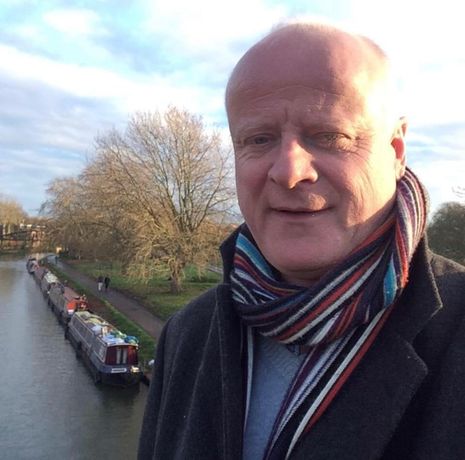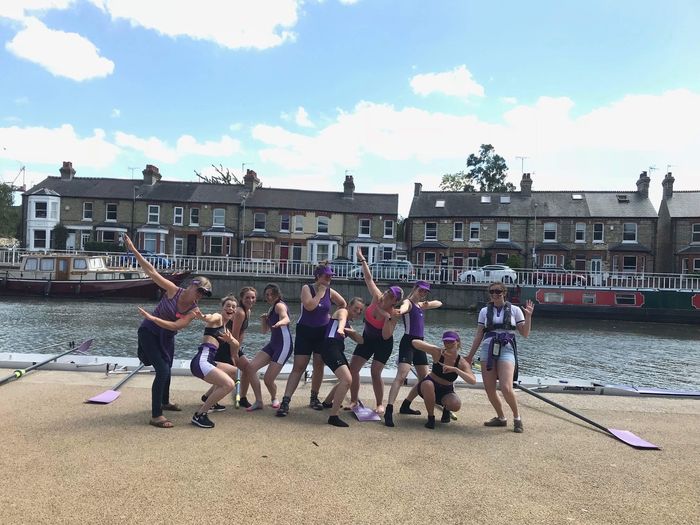The boatmen of the river Cam: an interview with Andrew James
Clare boatman Andrew James speaks to Ryan Cummings about life in a canal boat, sailing the Cam, and the lack of central heating.

“A lot of people that move in are shocked to be woken up by rowers, but what else to expect when you choose to live on the river?”, Andrew James tells me.
Andrew James has seen the river both from the perspective of a rower, and that of a boatman. Affectionately referred to as ‘Gripper’- a nickname the meaning of which has long been lost amidst the wash of many fruitful years as the Clare boatman, James straddles two disparate groups that seldom interact.
Numbering at just 120 narrowboats along the city’s stretch of river, the Cambridge boatmen are composed of some 254 men and women. They bear a (sometimes fraught) relationship with college rowers.
“The large crossover between the river and the rowing community makes relations more friendly.”
Anyone that’s rowed for long enough could regale you with stories of being screamed at from a barge, variously being called ‘elitist snobs’, ‘bird murderers’ and any number of expletives that, true to form, could only come from sailors.
James is optimistic about rowers’ relationship with boatmen. “Things have definitely improved”, he states. “Back in the old days there was more of an us versus them mentality, but there’s such a large crossover now between the river and the rowing community that relations are much more friendly.”
James, the much beloved boatman of Clare College, first started rowing at a young age as a member of the club for the University workers’ families. Now, living on a canal boat, he’s seen the river from both the rowing boat and the narrow boat. His canal boat, alleged to be sinking, is called ‘U-Boot’ - German for submarine.

To rowing, perseverance and friends
Following some change in his personal life, James decided that the humdrum life of being tied to mortgages and council tax was much less appealing than being tied to mooring posts and canalways. Despite his brother, the boatman of Downing boat club, jokingly referring to his boat as a “rat infested tin barge”, Andrew was undeterred.
“For most people it’s just a dream”, James says. “With waiting lists of anywhere between 5-10 years, many people sign up and then forget about it”. And for some, the idyllic dream of lazily floating along without a care in the world crashes into hard reality. “Everything is just a bit more effort. You have to check that your batteries are charged, your water tanks are topped up, remember to pump out the sewage regularly. There’s no central heating, you can’t just come back home and put your feet up.”
For James, however, the “massive sense of freedom that comes with living in a boat, and being able to sail down to Ely whenever you want”, makes it all worth it. He relishes “not being beholden to constant mortgage and tax payments”.
“Such economic reasons for taking to the river highlight the real problems cities face. Stagnant wages force people out onto the river and other low cost alternatives.”
For some boatmen and women, living on the river is the only affordable way to live comfortably in Cambridge. Compare paying, on average, £500,000 for a house in the city centre with £100 a month rent for a houseboat costing £30-60,000 and suddenly the buoyant life may seem a no brainer. Such economic reasons for taking to the river highlight the real problems faced by Cambridge and other UK cities. With stagnant wages and mounting house prices, many people are being forced out onto the river and other low cost alternatives.
To any river user: it seems Cantabs do not, in fact, rule the waves. It should be remembered we share this wonderful (read: disgustingly murky and potentially disease-infested) river with a much wider community, of whom the vast majority are incredibly nice and considerate people.
 Interviews / You don’t need to peak at Cambridge, says Robin Harding31 December 2025
Interviews / You don’t need to peak at Cambridge, says Robin Harding31 December 2025 News / Unions protest handling of redundancies at Epidemiology Unit30 December 2025
News / Unions protest handling of redundancies at Epidemiology Unit30 December 2025 Comment / What happened to men at Cambridge?31 December 2025
Comment / What happened to men at Cambridge?31 December 2025 Features / ‘Treated like we’re incompetent’: ents officers on college micromanagement30 December 2025
Features / ‘Treated like we’re incompetent’: ents officers on college micromanagement30 December 2025 Theatre / We should be filming ADC productions31 December 2025
Theatre / We should be filming ADC productions31 December 2025








